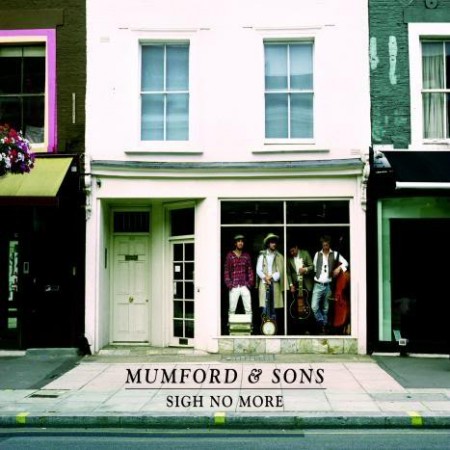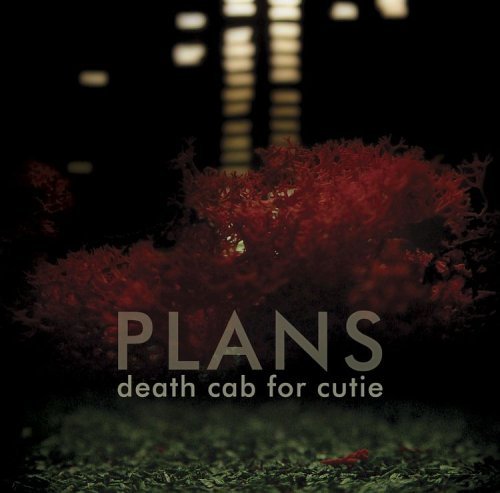by Gordon

Pitchfork: 2.1 Rolling Stone: N/A Metacritic: 65 Spin: N/A

Released: October 2009
Tracklisting:
-
Sigh No More
-
The Cave
-
Winter Winds
-
Roll Away Your Stone
-
White Blank Page
-
I Gave You All
-
Little Lion Man [LISTEN]
-
Timshel
-
Thistle & Weeds
-
Awake My Soul
-
Dustbowl Dance
-
After the Storm
I like folk, I like rock, and I like England. So when I was turned onto Mumford & Sons recently, I liked them. Although, the sound these four London lads produce sounds less like England and more like America, specifically the folk America of olden days that I can only guess of. Toting vests and button-down shirts, they seem to pay homage to more than just the music, in the process drawing similarities to CSN&Y, and perhaps Fleet Foxes too for doing the same. Their harmony-enriched melodies further the comparison, lead singer Marcus Mumford’s voice, given the right emphasis, sometimes almost a brother to Foxes’ frontman Robin Pecknold.
The “rock” categorization benefits the true definition of the genre, referring not to electric guitars and cymbal crashes, but to the true energy that exudes from an artist when passionately diving into their own music. The excitement of that energy doesn’t translate the same for every kind of music, but in this listener’s ears, it serves some of its best results in the folk arena. Most songs from their debut effort, meager as some begin, reach a place at some point where that passion takes over, causing a sort of anthemic overdrive from all four on their instruments in a display not far from that seen in one of the best folk-rock examples, The Avett Brothers.
Sigh No More opens with its title track, a light guitar plucking entering in followed by full-bodied harmonizing led by Mumford singing, “Serve God, love me and men/ This is not the end/ Live unbruised we are friends/ And I’m sorry/ I’m sorry,” the last lines crescendoing into a heartfelt bellow that one hopes forshadows the aforementioned display of excitement. It does, as the second half of the song takes a lyrically powerful stanza and repeats it three times, each time the emotion and music, aided by organ, bass, banjo and percussion, pounding more forcefully: “Love that will not betray you, dismay or enslave you/ It will set you free/ Be more like the man you were meant to be/ There is a design, an alignment to cry/ At my heart you see/ The beauty of love as it was made to be.”
Continuing in the theme of hope and meaning behind human improvement, upcoming third single “The Cave” (video below) sees Mumford mellowly attacking a catchy hook about empty hearts and barren harvests before the rest join in for the uplifiting chorus, guitar and piano taking a backseat to the often primary vocals. A short instrumental bridge showcasing some impressive banjo verifies the aggressive and heavy pace that’s yet to come. When it does come a bit later, the intensity is passionate and forceful enough to make you believe the floorboards are reverberating right there beneath your feet, the band singing, “But I will hold on hope/ And I won’t let you choke/ On the noose around your neck/ And I’ll find strength in pain/ And I will change my ways/ I’ll know my name as it’s called again.”
Another powerhouse of Sigh No More, voted #1 on a 100 Hottest of 2009 list by listeners of a prominent Australian station, is “Little Lion Man”. Listen for yourself (above), and I’ll let Marcus Mumford describe the song in his own words: “I guess the sound of it grabs you a little bit by the balls – it’s quite an aggressive song, a bit more of a punch in the face. Or at least, for our stuff anyway – a lot of our stuff isn’t as hard-hitting as that. It felt like the right song to be the single because it represented the harder, darker side of what we do, and at the same time, the more folksy and punchy side.”
There’s a larger handful to admire on this album than just the ones mentioned, notably second single “Winter Winds”. Truly, no songs seem out of place, or somehow unworthy among others. What works for this promising (relatively) new band is the sincerity and honesty behind the words they sing, a characteristic that shines through in the music too. Mumford explains the effect of lyrics on their songs: “For me, personally, it’s the lyrics that I listen to again and again in a song. I place specific importance on them. I can’t write lyrics unless I really feel them and mean them.” Whatever life experiences have brought Mumford & Sons the lyrics behind Sigh No More and the inspired music that followed, it’s certainly served them well so far.




















